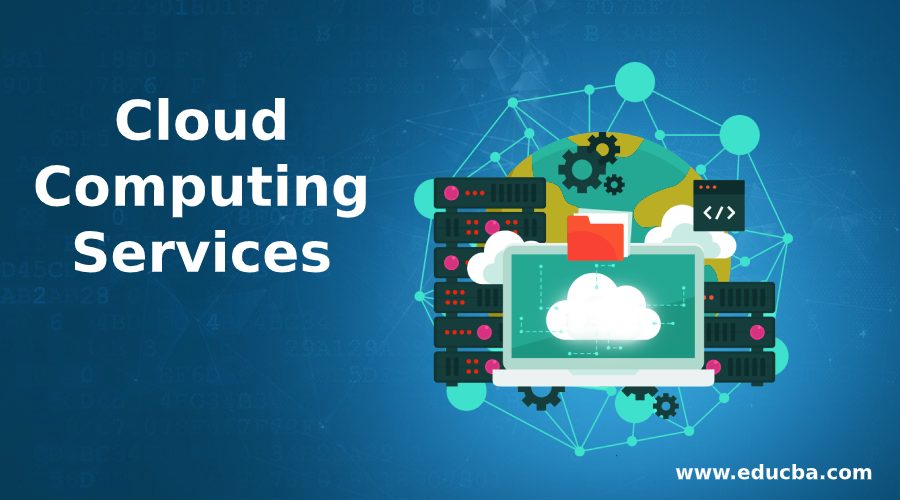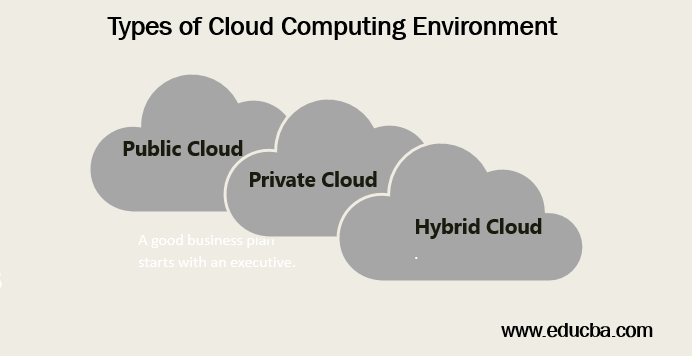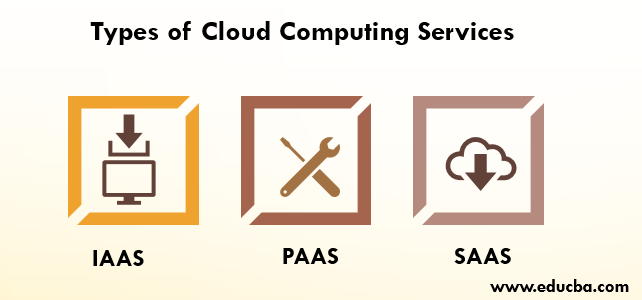Updated June 9, 2023

Introduction to Cloud Computing Services
The following article provides an outline for Cloud Computing Services. In the present world, with technical advancement, everyone is growing their business, and everything is available globally. In effect of globalization, it is almost mandatory that applications should be up and running every second with flawless speed and efficiency. Also, it should be able to handle different types of load. Along with all these challenges, the data that the application stores is also important. It should be readily available at any point in time and in the correct form. To manage all these problems, one needs hundreds and thousands of server and storage services. Also, the team of professionals to maintain and manage the infrastructure. To save us from all this overhead, Cloud Computing comes into the picture.
What is Cloud Computing? As the name suggests, Cloud computing is something that lets you store your data, process it, host your application but will not occupy space in your system and you need not worry about management and maintenance of the services. By opting for cloud services, all the servers and storage services are provided by a third party. Cloud Computing Services are the services that are mainly provided by big corporate giants which let you host your application and do big computing tasks without the overhead of managing the underlying infrastructure. Microsoft provides Microsoft Azure; Amazon provides AWS; Google has Google Cloud Platform. Apart from these companies, a business or organization can also have a private cloud.
Advantages
Following are the advantages which are listed below:
1. Cost
Cloud Computing is cost-efficient as one doesn’t need to import all the hardware and software into their system. It provides all the hardware and software. Also, the maintenance cost is saved as one doesn’t need to hire a special team just for the maintenance of the system; all is taken care of by the cloud provider.
2. Performance
Performance is greatly improved as the cloud provider makes sure that the server is always available for services. The data is saved in the cloud itself and duplicated from time to time to save it from unexpected loss. Hence making the performance better. Also, one can choose the type of server you want to support their services. All the updates and installations are taken care of by the service provider.
3. Efficiency
With readily available systems and complex algorithms to distribute the data on those systems, cloud computing is very efficient to process the data. It makes sure that the load is distributed to different systems as per the requirements. Thus making the processing quick and efficient.
4. Scalability
One of the main advantages of Cloud Computing is that it scales up and down according to the requirements. So the user has to pay only for the services that are used. If at any point of time one need more processor that can be easily spun up for the processing and as soon as the work is done, the processor can be spun down. And you will have to pay only what you used.
5. Security
With increasing cybercrime, security is one of the important aspects. It is a general perception that if something is available online, it is not secure. In cloud computing, the service provider lets you manage the access and security-related policies. The service user will have the right to decide to whom he/she wants to give access and to what extent. Also, the security of all the systems present in a cloud environment is taken care of by a service provider. All the systems are secured by antiviruses and frequently upgrade to make sure that the data inside them is secured.
Types of Cloud Computing Environment
According to business requirements, there are different types of Cloud Computing environments. Some need the cloud system to be in-house, whereas some want all the overhead to be handled by a cloud provider itself.
There are mainly three types of Cloud Computing Environment:
1. Public Cloud
In a public cloud, all the services are provided by a third party. All the software and hardware are provided and managed by the cloud service provider. The user just needs to manage access to those resources. Example: Microsoft Azure, Amazon Web Service, etc.
2. Private Cloud
Some prefer cloud resources to be exclusively owned and operated by a single business or organization. These types of businesses or organizations maintain and manage all the resources on their own. All the resources are hosted at their private network.
3. Hybrid Cloud
Some business wants to manage critical services on their own and host less critical services on cloud provided by the third party. These types of Cloud services are called the Hybrid Cloud. These types of Cloud security of critical applications are managed by the business itself. And the data is allowed to flow between private clouds and the public cloud.
Types of Cloud Computing Services
Most cloud computing services are provided in three categories Infrastructure as a Service (IAAS), Platform as a Service (PAAS), and Software as a Service (SAAS).
These are different levels of abstractions provide by cloud services.
1. Infrastructure as a Service (IAAS)
This is the lowest level of abstractions. In these types of services, a user is given to choose the underlying infrastructure like a type of operating system, type of ram and memory, amount of memory, type of antivirus, etc. This lets a user configure the virtual machine they want to use on a pay-as-you-go basis. This means the user will pay only for the number of resources he/she is using.
Example – Amazon Web Service, Microsoft Azure, Google Compute Engine.
2. Platform as a Service (PAAS)
Platform as a service reference to the cloud service where a user need not worry about underlying infrastructure but can have different web apps and mobile apps supported by the cloud. It is just like a framework on which applications can be built. It makes the development, testing, and deployment of applications quick and simple.
Example – Apprenda, Apache Stratos, etc.
3. Software as a Service (SAAS)
Software as a Service is the one in which a cloud service provider handles everything. A user just needs to access the software over the Internet. The application has its data center with the cloud provider, and the user has a subscription to it. The user need not worry about any updates and compatibility with hardware. He/she just needs an internet connection to use it.
Example – Google Apps, WebEx, Salesforce
Thus cloud computing services are a new age technology that makes users focus on the growth of business and leave aside the technical issues.
Recommended Articles
This has been a guide to Cloud Computing Services. Here we have discussed the cloud computing services basic concept, various types, along with advantages in detail. You may also look at the following articles:




